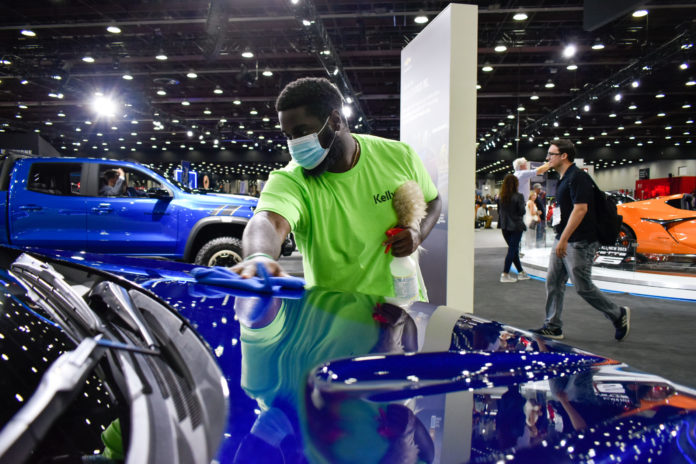We knew, or should have known, that the transition from gasoline to electricity-fueled vehicles was going to be bumpier than driving down a pothole-strewn Michigan road.
The internal combustion engine has powered cars and trucks for more than a century. Shifting to a new power source is the biggest personal mobility transition since the automobile replaced the horse more than 100 years ago.
But the challenges to achieving a cleaner form of transportation seem to be mounting by the day. And it is far from clear who the winners and losers will be, with major implications for Michigan’s economy.
Among those risks are consumer acceptance of electric vehicles that on average cost about $12,000 more than a gas-powered car, a currently inadequate vehicle charging infrastructure, dependence on battery materials from China and a growing list of competitors that threaten the viability of Detroit automakers.
Make no mistake: the venerable internal combustion engine is going away because it must. The transportation sector is the single-largest emitter of greenhouse gasses that are warming the planet. As a result, the world’s leading countries are legislating the internal combustion engine out of existence.
Rick Haglund: Will the new UAW president’s tough talk translate to wins at the bargaining table?
But it’s likely to be several more decades before the number of electric vehicles on the road in the United States exceeds the number of gas-powered vehicles.
Sales of electric cars and trucks are accelerating but still represent just over 7% of total U.S. vehicle sales.
The percentage of electric vehicles on the road in the United States won’t hit 50% of total vehicles in use until 2050, according to a presentation by University of Michigan economists at May’s state revenue estimating conference.
The economists also predict that new electric vehicle sales won’t amount to 50% of total vehicle sales until around 2038, about eight years later than President Joe Biden’s goal.
That could be good and bad for Michigan. Bad because delaying the demise of the internal combustion engine will make it harder to fight the disastrous effects of climate change.
But a slower adoption of electric vehicles could give Michigan’s economy more time to absorb jobs lost in internal combustion engine and transmission plants, and in supplier plants that produce parts for gas-powered cars and trucks.
“We think electric vehicles reduce [manufacturing] jobs by 30%,” said Donald Grimes, the U of M economist who prepared the electric vehicle forecast.
Jobs in Michigan auto assembly plants could fall by as much as 20% as the industry shifts to electric vehicles that require fewer parts than gas-powered vehicles, Grimes said. The percentage of jobs lost in plants making parts for gas vehicles could be double that figure.
“Those plants completely disappear,” he told me.
The U of M forecast shows a slight gain in auto manufacturing and parts jobs through the early 2030s, but a steady drop through 2050 as electric vehicles take hold.
New jobs in battery plants likely won’t make up for those lost in auto assembly and parts plants, although those factories are essential for the transition to electric cars and trucks.
But the lower wages paid in battery plants, which are typically joint ventures between automakers and battery manufacturers, will be a major sticking point between the United Auto Workers union and Detroit automakers in this summer’s contract talks.
Starting pay at battery plants is $16.50 an hour, about half of what UAW workers earn in automaker assembly plants. UAW President Shawn Fain said automakers are paying “poverty wages” at these plants.
Fain has taken the unusual step of withholding the union’s reelection endorsement of Biden until the union’s concerns about wages, jobs and other issues regarding electric vehicles are addressed by the administration.
“The EV transition is at serious risk of becoming a race to the bottom,” Fain wrote in a letter last month to UAW staff that was first reported by the Detroit News.
The EV transition is at serious risk of becoming a race to the bottom.
– UAW President Shawn Fain
U of M’s long-range electric vehicle forecast lends credence to Fain’s concerns.
The biggest risk to Detroit’s automakers is that they ultimately lose market share to established foreign competitors, such as Toyota and Hyundai, and a host of new electric vehicle competitors, including Tesla, Rivian and Vinfast, a Vietnamese company. None of their workers are represented by the UAW.
“There’s a load of new competitors out there,” Grimes said. “That’s got to come out of somebody’s hide.”
Take, for example, Polestar, which is planning to build a dealership in Birmingham along Woodward Avenue, home to the Dream Cruise and a longtime symbol of Detroit’s auto industry. Polestar is the electric vehicle brand of Volvo, which is owned by Chinese automaker Geely. Its cars are made in China and in a factory in South Carolina.
Michigan’s future success as the leading electric vehicle and battery manufacturing state depends not so much on state and local government support, but on Detroit automakers’ success in making and selling the kinds of cars and trucks consumers most desire.
A steep loss of market share by Detroit automakers would wipe out tens of thousands of auto manufacturing jobs in the state by 2050, according to the U of M forecast.
“If that happens, it will be a pretty painful period for Michigan,” Grimes said. “That’s what I really fear.”

